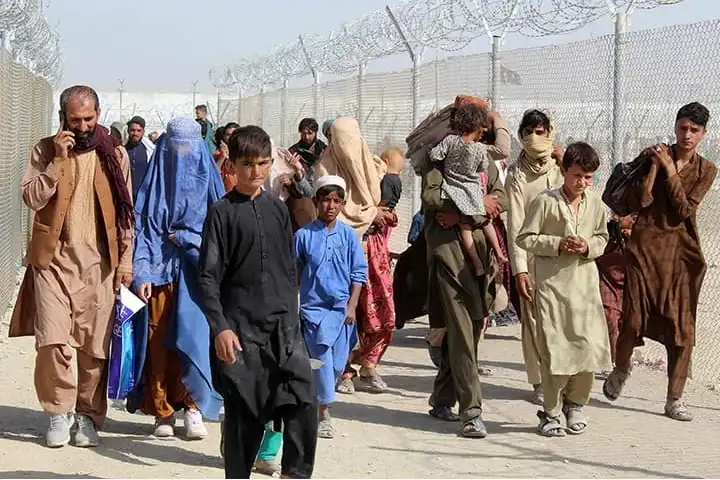

The Pakistan government says more than four million foreigners live in Pakistan and the government claims nearly 1.7 million of those Afghans are undocumented and they are being deported.
Pakistan is using “threats, abuse, detention and coercion” to throw out Afghan refugees as the deadline for them to voluntarily leave the country expired on November 1. Alarmed with plight of these Afghans being sent to ill-prepared Afghanistan which is tackling earthquake-devastated internal refugees, Pakistani politicians and activists like Farhatullah Babar, Imaan Zainab Mazari and Jibran Nasir have moved Supreme Court seeking pause on this “inhuman” expulsion.
The Taliban government on its part said that Pakistan must show “Islamic brotherhood” and “magnanimity” while dealing with Afghan refugees who have been in Pakistan for decades.
Petitioners challenged the caretakers’ mandate to formulate such a policy against “illegal residents and asylum seekers” living in the country for decades. “It is a reversal of Pakistan’s 40-year-old policy,” they said, claiming that no provision of law permits such mass deportation.
Even schools for these Afghan refugees have been force-shut, leaving children’s education in lurch and given the conditions in Afghanistan, it seems unlikely that they will be able to resume their education any time soon, or at all.
Interim Interior Minister Sarfraz Bugti, who has been warning Afghan refugees in tough language, shared a video of Afghan nationals lined up to board a bus to the neighbouring country.
“This action is a testament to Pakistan’s determination to repatriate any individuals residing in the country without proper documentation,” he said.
According to state-run Radio Pakistan, it is the first time in the country’s history that the interior ministry has “issued instructions to all provinces to deport illegal foreigners under the Foreigners Act”.
Taliban reaction
The Islamic Emirate of Afghanistan (IEA) has asked Pakistan to exercise tolerance and avoid the expulsion of Afghan refugees in line of Islamic brotherhood and humanitarian concerns.
The Taliban government urged Pakistan to give undocumented Afghans in the country more time to leave as pressure mounts at border posts swarmed by thousands of returnees fleeing the threat of deportation.
“We assure those Afghans who have gone to foreign countries due to some concerns that they can return and live a dignified life in their country,” Afghan government spokesperson Zabiullah Mujjahid said in a message.
The Supreme Leader of the Islamic Emirate Haibatullah Akhundzada has established a high commission led by Maulavi Abdul Salam Hanafi, the deputy prime minister for administrative affairs, and consists of 31 high ranking officials, aimed at resolving the problems of forcibly deported Afghan refugees from Pakistan and other countries.
In order to provide basic services to the returnees, a procedure has been approved in 8 chapters and 31 articles, and a secretariat and 12 committees have been formed to implement this procedure, Taliban sources said.
Nasser Ahmad Faiq, Chargé d’Affaires of Afghanistan’s Permanent Mission to the United Nations, wrote on X: “Urgent action needed: Despite calls from UN officials, Pakistan is expelling Afghan refugees, violating international human rights conventions.”
International Outcry
Human Rights Watch said in a report that the Pakistani government is “using threats, abuse, and detention to coerce Afghan asylum seekers without legal status to return to Afghanistan, and that too by announcing an arbitrary deadline.
Many Afghans at risk of being deported, the HRW said, “are awaiting resettlement to the United States, United Kingdom, Germany, and Canada.
It also called on the governments of the US, UK, Germany, and Canada to expedite resettlement for Afghans from Pakistan who are particularly at risk, including women and girls, human rights activists, and journalists.
“Broad calls by Pakistani officials for mass deportation have instigated increased police abuse against Afghans, including harassment, assault, and arbitrary detention,” the HRW said. “While not explicitly stated, Afghans slated for deportation are unlikely to be given the opportunity to challenge the action.”
Afghan-run Pakistan economy in doldrums
Working at garbage dumps, running lorries, travel agencies, roadside stalls, labourers in Khyber Pakhtunkhwa, Balochistan, Karachi and some urban centres in Punjab, Afghans are well-entrenched in Pakistani life and runs micro-economy ever since their migration started in 1970. Five districts — Peshawar, Harripur, Quetta, Islamabad and Attock – are known as Afghan-dominated. Quetta is believed to be run by Afghans entirely. The deportation of so many Afghans will create a vacuum that the Pakistani government eyes to fill with “unemployed, trade-less” Pakistanis seems easier said than done.
Replying to the question on Afghan absence from the Pakistani micro-economy, PM Kakar said that Islamabad was deporting those Afghans who are living for 40 years in Pakistan and are not paying tax. But do majdoors come under the tax-payer category in the least tax-paying nation of the world? Kakar left LUMS without answer.
Israel Defence Forces Spokesperson Brigadier General Effie Defrin on Thursday said that Iran has expressed…
India's Hindustan Aeronautics Limited (HAL) and French engine manufacturer, Safran Aircraft Engines, signed an agreement…
India has emerged as a country with the third-largest growth in power generation capacity globally…
Prime Minister Narendra Modi hailed Indian chess grandmaster Divya Deshmukh for defeating world number one…
The family of detained Baloch leader Mahrang Baloch has accused prison authorities at Quetta's Hudda…
The QS World University 2026 Rankings bring great news for our education sector, as the…